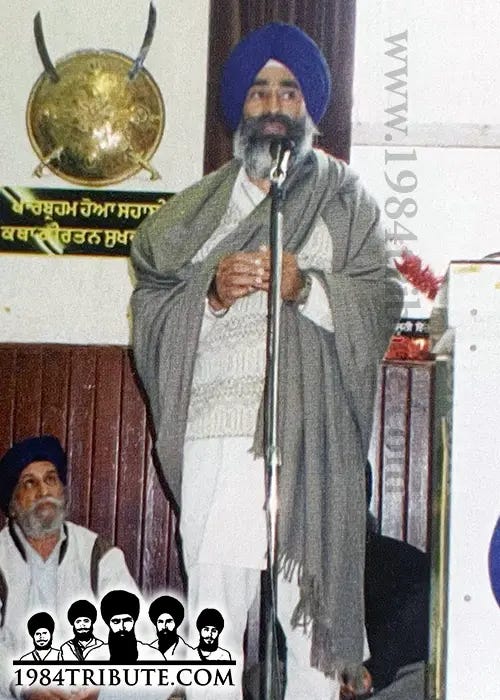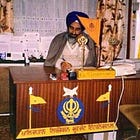A Beacon of Liberation: Understanding Shaheed Bhai Jaswant Singh Khalra
“When the Guru gave the gurgaddi to Sri Guru Granth Sahib, the Guru kept one special gift, which any Sikh could receive. After their Guru, Sikhs pay the most respect to that special gift. This special gift, that resides with the Guru, is the gift of shaheedi.”
From Shaheed Bhai Jaswant Singh Khalra’s last speech
Today marks the disappearance and shaheedi of Bhai Jaswant Singh Khalra. To mark his legacy, we have compiled several resources that help us understand Shaheed Bhai Jaswant Singh Khalra’s life, seva and sacrifice. Engaging directly with his own thoughts and writing on Sikh liberation, these resources shatter the manufactured image of Bhai Jaswant Singh as an apolitical “human rights” activist by illustrating his deep commitment to radical political transformation and Sikh resistance. While many prominent Sikhs and Sikh organizations have erected a domesticated buth (idol/facade) of Bhai Khalra as a “safe” figure whose sole contribution was documenting the victimhood of Sikhs in Punjab, a closer look at his life and legacy demonstrates this to be patently false.
Bhai Jaswant Singh Khalra’s life revolved around revolutionary politics and radical social transformation. From his early ancestors like Bhai Sura Singh who attained shaheedi alongside the legendary Bhai Tara Singh Vaan, to his grandfather, Bhai Harnam Singh, who joined the Gadhri babay in their anti-colonial resistance to the British Firanghi (colonizers), Bhai Khalra was steeped in the Sikh radical tradition which took various forms throughout his life. From engaging with the revolutionary Naxalite movement in Punjab before it capitulated to Indian nationalism, to working closely with the Panthic Committee during the Sikh sangarsh for Khalistan, and eventually founding Liberation Khalistan, a UK-based magazine he used to articulate his thoughts around the Sikh struggle, Bhai Jaswant Singh constantly immersed in revolutionary politics.
As seen throughout the resources below, Bhai Jaswant Singh Khalra’s historic human rights advocacy was intricately intertwined with his commitment to the political project for Sikh liberation.
Many Sikhs make a point of watching Bhai Jaswant Singh jee’s last speech every year around the date of his disappearance. In this final speech, Bhai Khalra powerfully speaks about ankhila Punjab and the centrality of the Khalsa and shahadat to every era of sangarsh (struggle) in Punjab. As well as the famous speech there are a number of articles that bring Shaheed Bhai Jaswant Singh’s political ideas to the foreground.
In the early 1990s, Shaheed Bhai Jaswant Singh Jee Khalra founded and edited a monthly magazine known as “Liberation Khalistan.” In the following article, Bhai Jaswant Singh explicitly engages with the role of elections in the ongoing Sikh sangarsh and whether Khalistani factions should engage or not. Bhai Khalra powerfully dissects the nature of electoral politics and the conditions they occur in, drawing our attention to powerful parallels today.
“The call of Sant Jarnail Singh Ji Bhindranwale for Khalistan was cultivated within them through their pursuit of learning Gurbani. For this reason their activities for Khalistan had the seal of Gurbani, they would ask every Sikh to attach themselves to Gurbani to become a Khalistani.”
Shaheed Bhai Jaswant Singh Ji, ‘Liberation Khalistan’, Year 1, Issue 1, Jan 1992
This article, published by Baaz News, engages with Bhai Jaswant Singh’s written work in juxtaposition to announcements around a feature film about Shaheed Bhai Jaswant Singh Khalra starring Diljit Dosanjh. The article punctures mainstream portrayals of Bhai Khalra and challenges the value of films which intentionally denigrate the holistic being and politics of our shaheeds.
Reduced to Ashes: The Insurgency and Human Rights in Punjab, provides a detailed account of Bhai Khalra’s personal life interwoven into the history of Punjab over the past several decades. In addition to this thorough historical account, Reduced to Ashes builds on Bhai Khalra’s concrete documentation of the crimes against humanity committed by Indian security forces throughout the 1980s and 1990s.
This article, quoted below, takes an in-depth look at the work Shaheed Bhai Jaswant Singh Khalra in the context of the Khalistani struggle.
“[Shaheed Bhai Jaswant Singh’s] efforts were mainly targeted towards Sikhs, with his most famous speech given in Punjabi from an openly pro-Khalistan Gurdwara stage. His work inspired Sikhs to rise up and challenge the darkness imposed upon them by the facist Brahmanical Indian state, and commit themselves to the liberation of their spirit and bodies, through the struggle for Khalistan. He paid reverence to the heroes of the Sikh Quam, the Shaheeds, who had given their lives for the Sangarsh”
“Tens of thousands of Sikhs were made to disappear; abducted, tortured, murdered, and disposed of without trace. Khalra’s work involved investigating these deaths in order to try and bring closure to grief-stricken families, to confirm to them the fate of their loved ones. A gross violation of India’s international obligations during civil war and the constitutional rights of those it claimed citizens, Indian security forces stopped returning the mutilated bodies of both Jujharoo Sikhs (Sikh warriors) and Sikh civilians. The Indian state sought to hide the hideous evidence of torture, by denying the family the body of their deceased the state aimed to prevent the mass gatherings at Bhog ceremonies that had become galvanising moments for Sikh Sangat to come together.”
Lastly, Shaheed Jaswant Singh Khalra: Soch, Sangarsh Ate Shahadat provides perhaps the most comprehensive and authentic account of Bhai Khalra’s life, politics, and shahadat. Based on his own first-hand experiences with Bhai Khalra during the Naxalite movement, Bhai Ajmer Singh engaged with Bhai Jaswant Singh’s closest friends and family to better understand what motivated him down this path of sangarsh and shahadat. The single most significant contribution of this book however, is finally providing open access to Bhai Jaswant Singh Khalra’s own political writings and analysis at the peak of the Khalistan movement. Engaging with his writings directly, it is unequivocally clear that Bhai Khalra was deeply entrenched in the politics of the time and his human rights advocacy was an extension of this rather than a disavowal. His writings clearly demonstrate a deep-rooted and soulful commitment to gursikhi, shahadat, and the cause of Sikh liberation.




